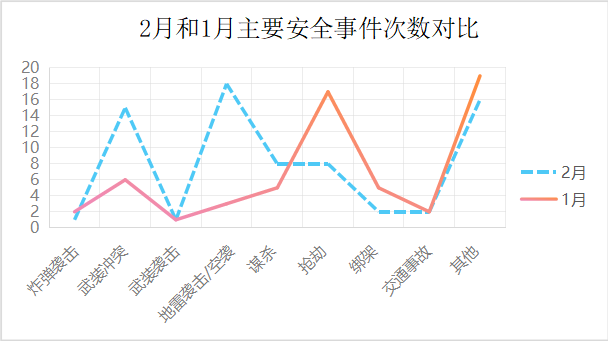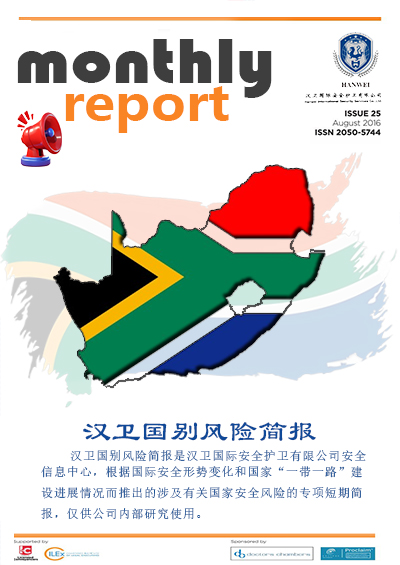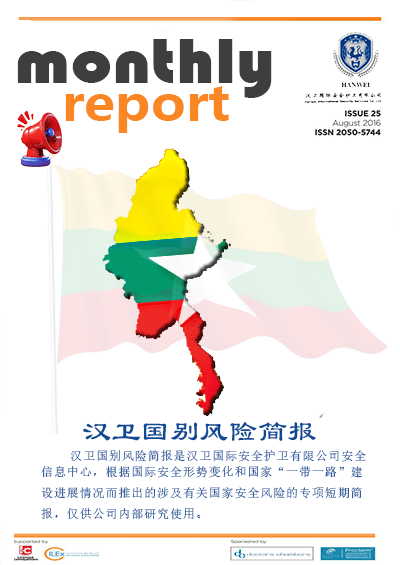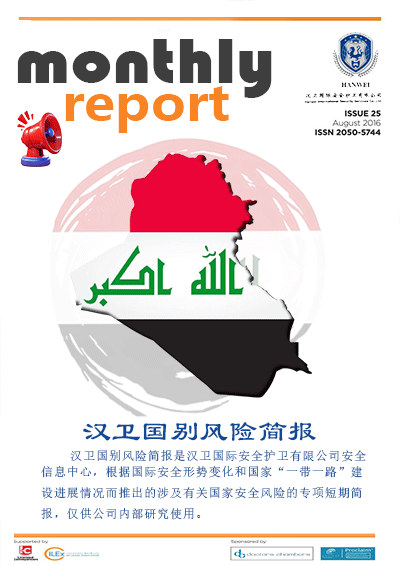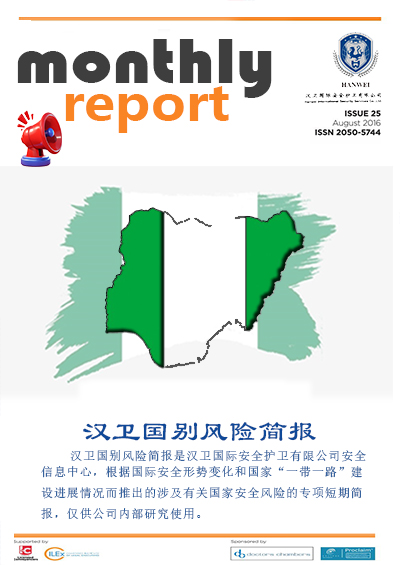February Risk Monthly Report for Myanmar
According to the security public opinion report of Hanwei International, a total of 102 representative security incidents occurred in Myanmar in February, 42 more than in January. These security incidents resulted in 125 deaths and 3969 injuries. Among the categorized security incidents, robberies and armed conflicts were the main types. Most incidents occurred in Shan State, Mandalay, Yangon, etc.
Hanwei International analyzes that the situation in Myanmar remains tense with ongoing conflicts. Statistics show that the number of security incidents increased compared with the previous month, with fewer deaths but more injuries. The significant increase in injuries is mainly due to 3797 people suffering from skin diseases caused by ammunition and gunpowder contaminating residents' drinking water. The negotiations between the Myanmar military government and the Ta'ang National Liberation Army (TNLA) ended without success, leaving the situation in Myanmar still tense and conflicts continuing.
Urging Compliance with Humanitarian Law, Internal Negotiations FailOn February 1, 46 non-governmental organizations called on the international community to take urgent action to increase pressure on the Myanmar military government, prevent the entry of weapons and aviation fuel, ensure accountability for atrocities committed by the Myanmar military government, and urge all parties to the conflict in Myanmar to abide by international humanitarian law. On the morning of February 5 at 9:00, Thailand began cutting off internet, electricity, and fuel supplies to the Myawaddy area on the Thailand-Myanmar border. Thai Deputy Prime Minister and Minister of the Interior Anutin previously stated that, in accordance with the cabinet resolution, the Thai Ministry of the Interior could coordinate with relevant agencies to suspend cross-border public utility services that might be used for illegal purposes such as drug trafficking, money laundering, fraud, and human trafficking. On February 15, a key development occurred in Myanmar's situation: representatives of the Ta'ang National Liberation Army (TNLA) and the Myanmar military arrived at the negotiation venue. With the active mediation of neighboring countries, the two sides were about to start important peace talks aimed at easing tensions and promoting regional peace and stability. On February 18, the negotiations between the TNLA and the Myanmar military government held in Kunming, Yunnan Province, only involved the exchange of their respective demands and opinions, including the cessation of military operations by both forces in their current controlled areas to achieve a ceasefire; a comprehensive halt to all actions including drone attacks, heavy weapons strikes, and warplane bombings; and ensuring the free movement of civilians in the controlled areas of both sides, as well as the smooth transportation of food, medicine, and other daily necessities. However, due to a deadlock in negotiations, the talks ended in failure. The TNLA stated that it would prepare for the next round of negotiations, while the Myanmar military government has not yet responded. On February 18, the State Administration Council of Myanmar promulgated the "Private Security Services Law". Applicants for private security business licenses must be companies registered in accordance with Myanmar's laws and ensure that they will not endanger national security. A deposit of at least 100 million kyats must be deposited in a designated bank. Foreign employees engaged in private security work must meet the standards of the Ministry of Labor, provide clearance certificates from their home countries, and must not be members of any armed forces. Foreign companies must ensure that at least 75% of their security personnel are Myanmar nationals. After obtaining approval from Myanmar's National Defense and Security Council, companies can allocate weapons to their security personnel.
Myanmar's Monopolized Economy and Sluggish Economic Operation On January 30, at a meeting of the Myanmar Investment Commission held in the conference room of the 18th Government Office in Naypyidaw, the capital of Myanmar, 14 companies applying to invest in Myanmar were approved, with a total investment of 345 billion kyats and 3.68 million US dollars, creating 1,500 job opportunities. On February 11, the Special Advisory Council on Myanmar (SAC-M) released a report by Australian economist Professor Sean Turnell, stating that the Myanmar military monopolizes Myanmar's economy and uses it as a tool to oppress the people. The international community was also urged to impose more effective sanctions on Myanmar's military-owned enterprises and banks. Meanwhile, SAC-M personnel also called for the transfer of over 1 billion US dollars in assets seized by the Myanmar military and deposited in US banks to the National Unity Government and various ethnic minority groups. On February 20, the United Wa State Army (UWSA) of Myanmar held its annual conference and adopted a nine-point plan, including stimulating economic growth through the China-Myanmar Economic Corridor, conducting political reforms, reopening the Mansai tin mine, cracking down on illegal activities, and developing power production. Currently, Myanmar's economy continues to face inflationary pressures, and overall economic activities are in a "sluggish operation" state. Due to restrictions on informal economic activities, it currently relies solely on the formal economy for support. Supply chain disruptions have led to a continuous rise in commodity prices, while prices in key areas such as food, gold, currency, and automobiles have stabilized but remain high, urgently requiring the market to regain vitality.
Power and Internet Disruptions Restrict People's LivesRecently, digital monitoring organization ASSESS NOW released data showing that 2024 was the worst year globally for internet shutdowns, and Myanmar became the country with the most internet shutdowns in the world during that year. In addition to the internet shutdowns by Myanmar's own authorities, it also involved Thailand cutting off the internet between Myanmar and Laos, with multiple factors contributing to this situation. For a long time, Myanmar has been severely short of electricity, jokingly called a "power-free" country, and now frequent internet outages have undoubtedly brought more challenges to Myanmar people's lives and social development.On February 1, people held strikes and demonstrations in Yangon, Monywa Township, Yinmabin Township, Mingin Township in Sagaing Region, Dawei Township in Tanintharyi Region, Hpakant in Kachin State, and other areas to protest against the military dictatorship of the Myanmar military government and commemorate the 4th anniversary of the Myanmar revolution. In addition, Myanmar people in many countries including the United States, the United Kingdom, Germany, the Netherlands, Thailand, Japan, and South Korea also held rallies to protest in support of the revolution. On February 8, a group of activists supporting the Myanmar military government in Myawaddy Township, Karen State, held a demonstration to protest Thailand's power, fuel, and internet cuts on Myawaddy. They called for the closure of Myawaddy Bridges 1 and 2 at the Thailand-Myanmar trade point and ports along the Thaungyin River on the border to block the circulation of Thai goods. On February 18, according to Myanmar media irrawaddy, although Myanmar called on Thailand to lift the cuts on electricity, fuel, and internet, China requested Thailand to maintain this policy. A Thai Defense Ministry spokesperson stated that an assistant to China's Minister of Public Security advised Thailand on how to handle Myanmar's fraud issues, including a proposal to maintain the ban on electricity, fuel, and internet for Myanmar, as this plan has been significantly effective in cracking down on telecom fraud in Myanmar.
Armed Conflicts Continue, Casualties Mount On February 1, the People's Defense Force launched an attack on a Myanmar military base 8 miles north of Myingyan Township, Mandalay Region. A fierce battle broke out between the two sides. To defend the base, the Myanmar military deployed troops from the 15th Light Infantry Battalion and warplanes for strike support. The battle resulted in 2 deaths and 7 injuries. On February 2, the joint forces of the People's Defense Force and the Karen National Liberation Army (KNLA) captured the Myanmar military's Mipa Li camp in Bilin Township, Mon State, and captured 20 Myanmar military soldiers including a major. The camp is located among 3 camps controlled by the Karen National Union (KNU) and has an important strategic position. On the same day, the KNU announced that Myanmar military forces opened fire with heavy weapons in the area of Brigade 1 in Thaton District and Brigade 6 in Dooplaya District, causing 2 deaths and multiple injuries. On February 8, the Kachin Independence Army (KIA) announced the capture of the Myanmar military's 5014 Tank Battalion base in Bamaw Township, Kachin State. On the 14th, the KIA captured the No. 11 Medical Battalion of the Myanmar military in Bamaw Township. As of the 17th, the KIA had occupied the 7006 Armored Battalion, Bamaw Airport, the 366 Artillery Battalion, the 5014 Tank Battalion base, the No. 11 Medical Battalion, and other units. Currently, the KIA and its allies are engaged in continuous fierce battles with the Myanmar military to seize the headquarters of the No. 21 Military Command of the Myanmar military in Bamaw Township, with at least 78 people from both sides killed in the past week. On February 18, fighting broke out in Sittwe Township, Rakhine State, where the Arakan Army attacked the Myanmar military camp on Gaungdow Island. Myanmar military artillery fire caused a fire in the area bordering Sittwe Township and Pauk Taw Township. An explosion occurred at the No. 12 Police Camp of the Myanmar military, resulting in casualties. On February 21, the Arakan Army attacked the Dhanyawady Naval Base using drones and artillery. Myanmar military air strikes bombed Pauk Taw Township, causing 4 deaths and 17 injuries.
Recently, a Chinese national in Mandalay was seriously injured in a home invasion robbery. On February 18, the Consulate-General of the People's Republic of China in Mandalay reminded Chinese citizens in northern Myanmar to enhance risk awareness and strengthen security precautions: 1. Pay close attention to the surrounding security situation and public order environment; 2. Strengthen preventive measures; 3. Avoid displaying wealth; 4. Do not engage in direct conflicts.Suggestions from Hanwei International: Chinese citizens in Myanmar should minimize cash transactions or holding large amounts of cash to avoid becoming targets of criminals. In case of emergencies such as robbery or kidnapping, stay calm, prioritize personal safety, and do not engage in direct conflicts with criminals. After confirming personal safety, call the police in a timely manner.
Myanmar emergency police number: 0095-199Myanmar medical emergency number: 0095-192Consular protection and assistance hotline of the Consulate-General of the People's Republic of China in Mandalay: 0095-9-259172726Consular protection and assistance hotline of the Embassy of the People's Republic of China in Myanmar: 0095-9-43209657Ministry of Foreign Affairs global consular protection and service hotline (24-hour): 0086-10-12308 or 0086-10-65612308
Chart 1: Classification of Security Incidents in February
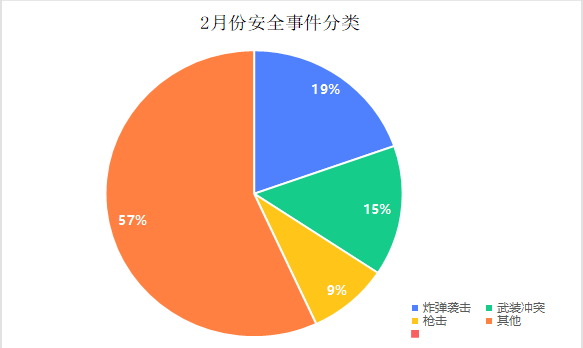
Chart 2: Statistics on Deaths/Injuries in February
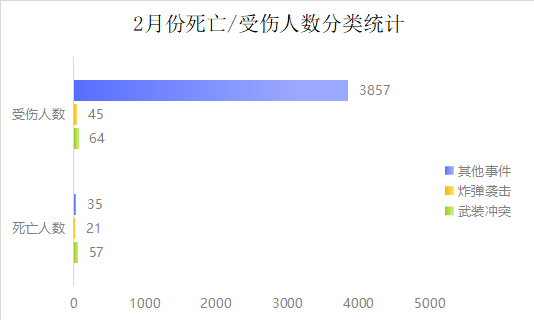
Chart 3: Statistics of Security Incidents in Major States/Regions in February
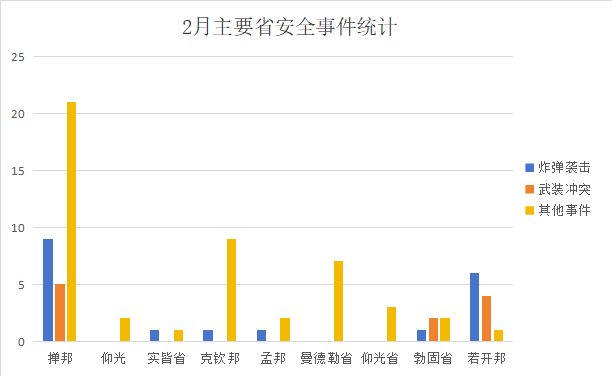
Chart 4: Comparison of Major Security Incidents Between February and January
